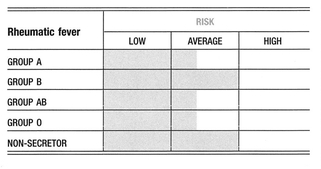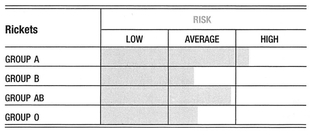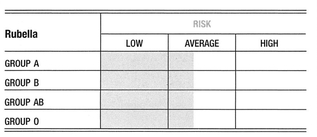R
RHEUMATIC FEVER/HEART DISEASE-An acute inflammatory complication of group A streptococcal infection.
Symptoms
In diagnosing rheumatic fever, doctors generally look for either the presence of two of the following major criteria or the presence of one major plus two minor criteria. In all cases, evidence of a preceding strep throat is key to making a diagnosis of rheumatic fever.
Major Criteria: • Inflammation of the heart, sometimes indicated by weakness and shortness of breath or chest pain
• Painful ARTHRITIS, most often affecting the ankles, wrists, knees, and elbows, and migrating from joint to joint
• Involuntary jerky movement of the limbs and face, or more subtle movement difficulties, such as marked deterioration in handwriting
• Broad, pink or faint-red, non-itching patches on the skin (uncommon)
• Lumps under the skin (uncommon)
Minor Criteria: • Joint pain without inflammation
• FEVER
• Previous rheumatic fever or evidence of rheumatic heart disease
• Abnormal heartbeat on an electrocardiogram
• Blood test indicating inflammation
• New heart murmurs
About Rheumatic Fever/Heart Disease
Rheumatic fever is a serious inflammatory condition that can affect many parts of the body—heart, joints, nervous system, and skin. Although rheumatic fever can occur at any age, the most frequent incidence is in young people between the ages of 5 and 15 years. Rheumatic fever is precipitated by an overactive immune response to a STREPTOCOCCAL INFECTION.
Blood Group Links
ABO non-secretors have a higher incidence of rheumatic fever and rheumatic heart disease, and are more susceptible to the overactive immune response to the streptococcal infection1.
Streptococcal infections occur more often in blood group B individuals than in the other blood groups, increasing their susceptibility to rheumatic fever2. There is also a connection between blood group B and neonatal group B streptococci infections. This association is strong enough to be evident even based on the mother’s blood group—that is, a blood group B infant with a blood group B mother has double the risk of infection3.
Therapies, Rheumatic Fever/Heart Disease
BLOOD GROUP A:
1. Immune-Enhancing Protocol
2. Antibacterial Protocol
BLOOD GROUP B:
1. Immune-Enhancing Protocol
2. Antibacterial Protocol
BLOOD GROUP AB:
1. Immune-Enhancing Protocol
2. Antibacterial Protocol
BLOOD GROUP O:
1. Immune-Enhancing Protocol
2. Antibacterial Protocol
Related Topics
Autoimmune disease (general)
Inflammation
Streptococcus infection
REFERENCES
1. Glynn AA, Glynn LE, Holborrow EJ. Secretion of blood group substances in rheumatic fever: a genetic requirement for susceptibility? Brit Med J. ii:266-270.
2. Ligtenberg AJ, Veerman EC, de Graaff J, Nieuw Amerongen AV. Saliva-induced aggregation of oral streptococci and the influence of blood group reactive substances. Arch Oral Biol. 1990;35 suppl:141S-143S.
3. Regan JA, Chao S, James LS. Maternal ABO blood group type B: a risk factor in the development of neonatal group B streptococcal disease. Pediatrics. 1978;62:504-509.
RHEUMATOID ARTHRITIS-See Arthritis, rheumatoid
RHINITIS-See Allergies, environmental/hay fever
RICKETS-Bone formation resulting from inadequate calcium in bones.
Symptoms
• Skeletal deformities
• Growth disturbances
• Hypocalcemia (abnormally low levels of calcium in the blood)
• Muscular weakness
• Irritability
About Rickets
Children with rickets have abnormal bone formation resulting from inadequate calcium in bones. This lack of calcium can result from inadequate exposure to sunshine or from lack of vitamin D in the diet. Vitamin D is essential for calcium absorption. Rickets is worsened by a lack of dietary calcium.
Rickets can also be caused by conditions that impair absorption of vitamin D and/or calcium, even when these nutrients are consumed in appropriate amounts. Activation of vitamin D in the body requires normal liver and kidney function. Damage to either organ can cause rickets.
Blood Group Links
In an effort to study the role of genetics in vitamin D deficiency rickets, 400 infants with rickets, aged from 6 months to 2 years, were randomly chosen and were examined for sex differences and ABO typing. A significant predominance of the male sex was found: the sex ratio was 1:43. Blood group A was significantly associated with rickets, both among males or females. The alkaline phosphatase values were significantly higher in male infants: 91% of them had levels above 30 alkaline phosphatase units, whereas the corresponding percentage of females was 72%. This indicates that the disease is more severe among males. The study gives added support for the belief that there is a genetic factor in nutritional rickets1.
Therapies, Rickets
ALL BLOOD GROUPS:
Sun exposure, required by the body to make vitamin D, must involve at least some direct exposure to skin (hands, face, arms, etc.). The ultraviolet light that triggers vitamin D formation is blocked by clothing. Depending on latitude, sunlight during the winter may not provide enough ultraviolet light to help the body make vitamin D. At other times during the year, even 30 minutes of exposure per day will usually lead to large increases in the amount of vitamin D made. If it is difficult to get sunlight exposure, full-spectrum lighting can be used to stimulate vitamin D production.
BLOOD GROUP A:
1. Liver Support Protocol
2. Stomach Health Protocol
3. Intestinal Health Protocol
BLOOD GROUP B:
1. Liver Support Protocol
2. Stomach Health Protocol
3. Intestinal Support Protocol
BLOOD GROUP AB:
1. Liver Support Protocol
2. Stomach Health Protocol
3. Intestinal Health Protocol
BLOOD GROUP O:
1. Liver Support Protocol
2. Stomach Health Protocol
3. Intestinal Health Protocol
Related Topics
Digestion
Musculoskeletal injury
REFERENCES
1. el-Kholy MS, Abdel Mageed FY, Farid FA. A genetic study of vitamin D deficiency rickets: 2-sex differences and ABO typing. J Egypt Public Health Assoc. 1992;67:213—222.
RUBELLA (GERMAN MEASLES)—Threeday measles.
Symptoms
• Malaise
• Swollen glands
• Rash
About Rubella
Rubella is a contagious viral infection, usually with mild constitutional symptoms, that may result in abortion, stillbirth, or congenital defects in infants born to mothers infected during the early months of pregnancy. Since rubella often goes undiagnosed in mild cases, it is impossible to know the exact percentage of those infected, but it is estimated that 10% to 15% of young women are not infected in childhood—which makes them vulnerable during pregnancy.
Epidemics occur at irregular intervals during the spring; major epidemics occur at about 6- to 9-year intervals. In the United States incidence is now at its lowest point in history. However, outbreaks continue to occur and rubella must still be identified and susceptible populations immunized. IMMUNITY appears to be lifelong after natural infection.
Blood Group Links
A case study noted that an infant with probable congenital rubella infection developed altered blood group expression. This was noted at 4 months of age. The child’s blood was tested on seven separate occasions during the first 8 weeks of life and identified as blood group A. However, on repeat testing, her cells failed to agglutinate with anti-A and anti-AB typing serum. The A antigen was present, however. Altered expression of blood group A (loss of agglutinability) has occurred previously only in association with hematologic (blood) malignancy1.
Therapies, Rubella
ALL BLOOD GROUPS:
The rubella vaccine should not be given to any person with a defective or altered immune system (such as those with LEUKEMIA, LYMPHOMA, or other malignancies), or to people who have a serious febrile illness, or during prolonged therapy with corticosteroids or radiation, or during chemotherapy.
BLOOD GROUP A:
1. Antiviral Protocol
2. Immune-Enhancing Protocol
BLOOD GROUP B:
1. Antiviral Protocol
2. Immune-Enhancing Protocol
BLOOD GROUP AB:
1. Antiviral Protocol
2. Immune-Enhancing Protocol
BLOOD GROUP O:
1. Antiviral Protocol
2. Immune-Enhancing Protocol
Related Topics
Immunity
Viral disease (general)
REFERENCES
1. Sherman LA, Silberstein LE, Berkman EM. Altered blood group expression in a patient with congenital rubella infection. Transfusion. 1984;24:267—269.



